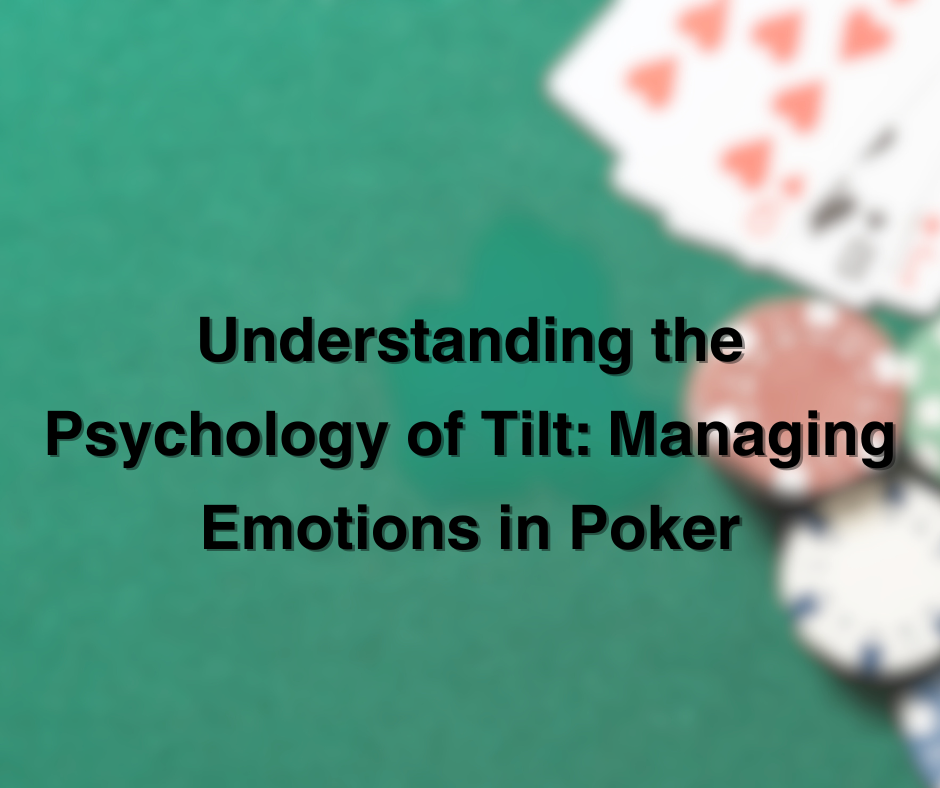
Table of Contents
ToggleWhat is tilt in poker?
In poker, tilt refers to a state of emotional or mental frustration that causes a player to play suboptimally. It often occurs after a significant loss or a series of bad beats, leading to irrational decision-making and increased aggression.
How does tilt affect poker players?
Tilt can have a profound impact on poker players, both psychologically and financially. It impairs judgment, leads to impulsive decisions, and causes unnecessary risks. This emotional state often creates a vicious cycle—losses lead to tilt, which leads to more poor decisions and further losses. Whether you’re just starting to play poker online or are a seasoned pro, recognizing and overcoming tilt is key to long-term success.
What are the common triggers of tilt?
Several factors can trigger tilt in poker players. Losing a significant hand, experiencing a series of bad beats, or encountering an obnoxious opponent can all contribute to tilt. Additionally, external
factors such as fatigue, stress, or distractions can exacerbate tilt and make it harder to control.
If you’re struggling with repeated losses, our guide on how to handle losing streaks without going on tilt offers practical tips to stay composed.
How can players recognize tilt?
Recognizing tilt is crucial for poker players to mitigate its effects. Signs of tilt may include increased heart rate, sweating, shallow breathing, and heightened emotional responses. Players should also be mindful of changes in their decision-making process, such as impulsive betting or deviation from a strategic game plan.
Strategies for managing tilt
Managing tilt requires a combination of self-awareness and discipline. One strategy is to take a break from the game to regain composure and refocus. Deep breathing exercises or meditation can help calm the mind and reduce stress. Setting limits on the amount of money or time spent playing can also prevent tilt from escalating.
If you’re playing with new poker rules in 2025, understanding rule changes can reduce the stress and surprises that trigger emotional reactions.
Developing emotional resilience
Building emotional resilience is essential for poker players to cope with the ups and downs of the game. This involves accepting that variance is inherent in poker and focusing on long-term results rather than short-term outcomes. Seeking support from peers or a mentor can provide valuable perspective and encouragement during challenging times.
or beginners and pros alike, coping with swings in the game is crucial. Our article on losing streaks and tilt dives deeper into this mindset.
The role of mindset in poker
Mindset plays a significant role in how players approach tilt. Adopting a growth mindset, which
emphasizes learning and improvement, can help players bounce back from setbacks and maintain a positive attitude. Avoiding negative self-talk and reframing losses as opportunities for growth can also bolster mental resilience.
Players who start playing poker online with a focus on mindset tend to grow faster and tilt less often.
Cultivating mindfulness at the table
Seeking professional help
For some players, managing tilt may require professional assistance. Therapists or counselors trained in cognitive-behavioral therapy (CBT) can help individuals identify and address underlying psychological issues contributing to tilt. They can also teach coping strategies and provide ongoing support to help players manage their emotions more effectively.
Building a supportive poker community
Strategies for Overcoming Tilt in Poker: A Comprehensive Guide
Identifying the Triggers of Tilt
Bad Beats: Experiencing a string of unlucky hands or losing a significant pot can trigger feelings of frustration and anger.
Obnoxious Opponents: Dealing with rude or disrespectful opponents can disrupt focus and exacerbate tilt.
Fatigue and Stress: Physical and mental exhaustion can impair judgment and make it harder to control emotions.
Distractions: External distractions, such as noise or interruptions, can disrupt concentration and increase susceptibility to tilt.
Developing Emotional Resilience
Emotional regulation is the bedrock of sound poker decision‑making. When anger, fear, or frustration seep in, they cloud judgment and distort risk assessment. Research shows that negative emotions like moral anger significantly reduce mathematical accuracy in poker decisions, particularly when players feel socially watched.
Maintaining a calm, analytical mindset—even after bad beats—preserves your ability to evaluate pot odds and ranges objectively.
Cultivating Mindfulness at the Table
Practicing mindfulness can help poker players stay grounded and focused during gameplay. Techniques such as:
Visualization: Visualizing successful outcomes and staying focused on the present moment can enhance concentration and prevent tilt.
Body Scanning: Paying attention to bodily sensations can help players stay attuned to their emotions and reactions, enabling them to make more rational decisions.
Sensory Awareness: Staying mindful of sensory experiences, such as the feel of the cards or the sounds of the chips, can enhance presence and prevent distractions.
Implementing Self-Regulation Strategies
Self-regulation is crucial for managing tilt and maintaining composure at the table. Key self-regulation strategies include:
Taking Breaks: Stepping away from the game when emotions run high can provide valuable time to regroup and refocus.
Deep Breathing: Engaging in deep breathing exercises can help calm the nervous system and reduce stress levels.
Setting Limits: Setting limits on the amount of time or money spent playing can prevent tilt from escalating and protect bankroll management.
Final Thoughts: Bluffing Monkeys’ Take on Tilt
Tilt in poker isn’t just about losing—it’s about how you respond to loss. From identifying triggers to managing emotions and seeking support, tilt is a challenge that every player must face.
At Bluffing Monkeys, we’re here to help you sharpen your game, stay composed under pressure, and make smarter plays with every hand.
